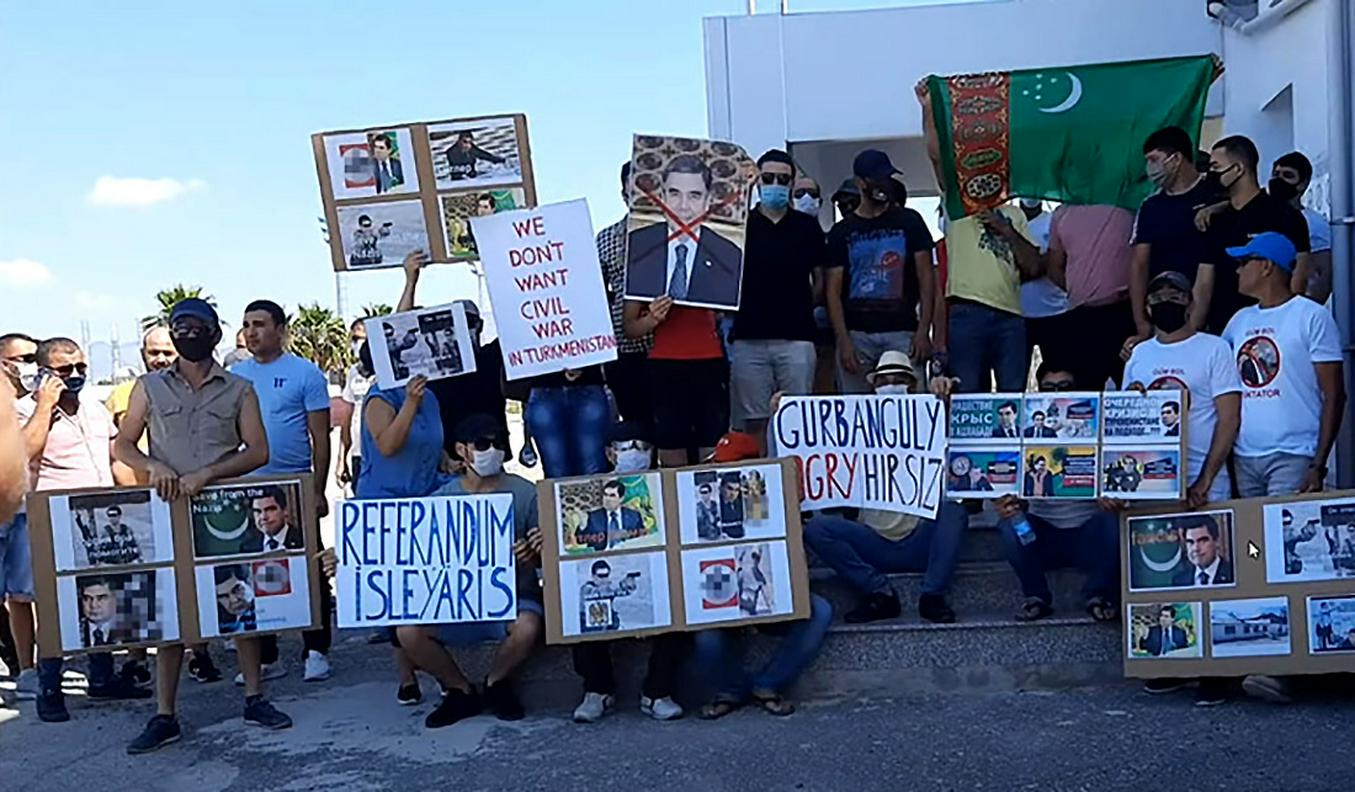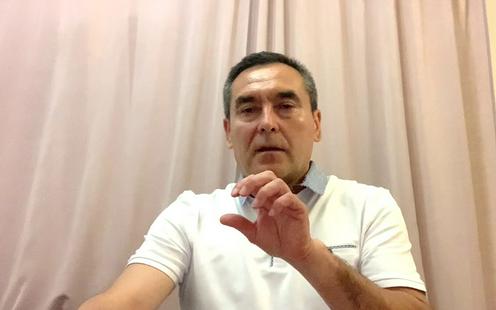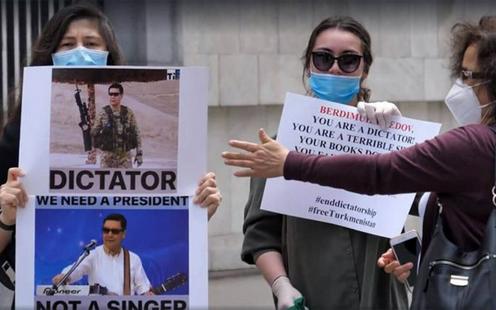On 17 June, Murad Dushemov, was arrested for participating in an opposition chat forum. According to his sister, Dushemov was led away by one police officer and three individuals in plainclothes, who later returned to take his computer. Dushemov was warned that if any oppositional material was found on his computer then he would be looking at a sentence of 15 years. Later he was released into house arrest, though it remains unclear exactly what the charges against him are.
Murad Dushemov’s arrest was reported by one of the founders of the new opposition movement Democratic Choice for Turkmenistan (DCT), Kakamurad Khydyrov, who also said that Dushemov had been active on a forum used by supporters of DCT. We spoke to another of DCT’s founders, Murad Kurbanov, and asked him how far it is possible to talk about a revival of opposition sentiment in the country, whose leader Gurbanguly Berdimuhamedow recently celebrated his 63rd birthday in lavish fashion.
– Which chat forum was Murad Dushemov using? Is it part of your new opposition movement?
– The Telegram chat group “Activist DVT” (@aсtivistdvt; DVT is the DCT’s initials in Russian – ed.) is a platform for discussions about the current situation in the country, where we generate ideas and discuss how to bring about change in the Turkmen state. We are trying to revive the spirit of civic engagement in Turkmen citizens. People have so many pent-up thoughts that in order to bring some order to the debate we have to set a specific theme for the discussions each week. This week, for instance, we are discussing how to hold demonstrations. Next week it will be a different issue.
– And it was this chat group that Murad Dushemov participated in?
– Yes, he was a very active participant, and I think we actually helped push him towards defining his political stance. Although actually, not long before his arrest, we had to block his account for a month. We have rules in the chat group: for verbal abuse, extremism and calls to violence we ban participants for one month for a first offence, then for six months, and finally for a year. Dushemov was warned a dozen times about the rules, but he continued to infringe them. After he was blocked he recorded a video message in which he criticised the whole opposition movement, including us. But after he was arrested we decided that we would fight for his release by all legal means, and by attracting the attention of international human rights organisations.
– So taking part in such chat groups from inside Turkmenistan remains a rather dangerous undertaking. Does your audience, like that of other oppositional platforms, consist mostly of emigrants?
– No, we have quite a few people in the chat group who remain inside Turkmenistan. But I would like to add that, according to our calculations, only around 1–1.2 million people are currently living in Turkmenistan and that the official government statistics are not entirely reliable.
– But the authorities insist that 6.2 million people live in the country, and the most recent unofficial figures suggest 3–3.5 million as of spring 2019.
– No, no, in my opinion there are no more than 1–1.2 million people left in the country. This is about the same as or even less than the number of Turkmen migrants in Turkey. Judge for yourselves: the typical family in Turkmenistan these days is composed of elderly people, children and, in general, just one working-age adult. All the other members of the family are away working as labour migrants or have simply emigrated. So when we say that the majority of opposition activists do not live in the country, this is not just a sign of the regime’s authoritarianism and the blocking of the internet. It also reflects the real demographics of the country. Nevertheless, DCT does not plan to limit itself to actions abroad – our goal is to reach those who remain in Turkmenistan.
– Presumably it is only young people who watch your content through the block?
– No. As far as I know, our activities are of interest to people of all ages. There is a huge amount of tension in the country. Only around five thousand citizens close to President Gurbanguly Berdimuhamedow live in ease and put up pretty pictures on Instagram. For everyone else, life is getting harder – new layoffs are taking place despite the already high unemployment, wages are being withheld, people have no money, and it is impossible to withdraw cash from ATMs. Huge queues form outside of state-run stores in order to purchase a limited number of products at special government prices, and rationing cards are being used to obtain food products.
For this reason the issues we are raising are of interest to all, not just the youth. Another issue is that, to our great sorrow, many of these people in fact know nothing about the existence of the constitution. They see government officials like chiefs. 28 years ago they traded their freedom for free gas, water and electricity (though now even these benefits have been withdraw). The goal of DCT is to raise the level of civic engagement in the population, to create a normal civil society, and teach people to think differently.
– But raising the civic engagement of a whole people is no easy task.
– Yes, now people are listening to what we have to say with pleasure, but they are not thinking about what they should do themselves. They are waiting for us to come and save them from the Arkadag (Berdimuhamedow’s official title, which means “Protector” in Turkmen – Fergana). But of course we cannot do this without their participation.
– And what do you suggest people should do?
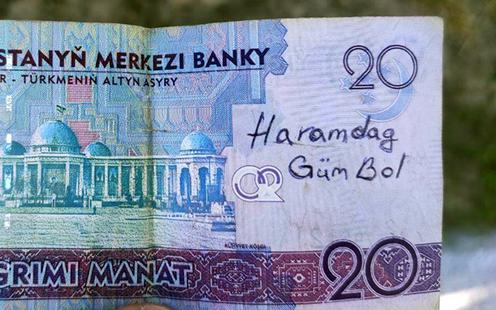 Slogans attacking Berdimuhamedow have begun to appear on bank notes in Ashgabat. This one makes a joke of the president’s title and tells him to “get lost”. Photo from Turkmen.news
Slogans attacking Berdimuhamedow have begun to appear on bank notes in Ashgabat. This one makes a joke of the president’s title and tells him to “get lost”. Photo from Turkmen.news
– They should work within the legal framework in Turkmenistan. DCT has started to carry out special protest actions on Turkmen soil. We have planned around 15 such actions in Turkmenistan and 10 in Turkey. For instance we will launch the campaign “Show your face”. We are encouraging our followers among the ranks of migrant workers to record a video in which, without covering their faces, they relate how they were forced to leave their homeland and how many years it is since they saw their families. The thing is, in order to leave the country these days, you have to pay a bribe of anything between $3,000 and $25,000. In such circumstances, going abroad for just a short period just doesn’t make economic sense. Migrants go for years without seeing their children and are unable to attend their parents’ funerals. Besides this, even when the time comes for people to renew their passports, returning to the country poses a risk (they might not be allowed out again). On the specific subject of passports, though, we plan to carry out another protest action.
So that’s how it is. Migrants’ family members who remain back home in Turkmenistan are essentially hostages of the regime. If a migrant gets spotted participating in some activity frowned upon by the government, officers from the Ministry of National Security (MNS) put pressure on his relatives. But we carried out some calculations... In order to exert pressure on a single family, you need deploy one police officer and at least three officers of the MNS (it is unclear if the calculations here are based on the arrest of Murad Dushemov, where one police officer and three individuals in plainclothes were involved — Fergana). What happens if migrants start to openly express their opinions en masse? For every thousand people who make such a statement, they will need at least eight thousand officers. And let’s say there are 100 MNS officers in total in the Dashoguz velayat (region). Even if they only have to put pressure on 300 families in the region, they won’t be able to do this effectively. Their efforts will be paralysed. When we’ve got together three thousand such statements, the remaining migrants won’t have to worry about expressing their opinions, and after ten thousand statements, the whole issue of hiding one’s identity will be forgotten forever.
– But what if the MNS starts to apply harsher methods of exerting pressure? If this leads to people’s lives being put at risk?
– No. First of all, killings would attract the attention of international organisations. Secondly, if the regime starts killing people then popular anger will be impossible to hold back. The regime knows this, and even during the harsh repressions of the start of the 2000s, members of the opposition were not sentenced to death, but rather sent off to the Ovadan Depe prison, where they gradually began to “disappear” one by one. And in recent years the security services have generally not been especially vicious, mostly they just talk to people. Their demands have softened – now they just ask people not to make public statements and not to express their discontent openly.
– So the political situation in Turkmenistan has changed?
– From the information that we’ve been able to obtain, Berdimuhamedow seems to be in a very poor state of health. On TV screens we are shown images of him operating machines, driving vehicles and practicing sports, but what we aren’t being shown is how, after all this, he has to lie in bed for weeks with a drip to restore his fragile health. And, of course, it is not he who runs the country, but the very same puppeteers who set up the personality cult around Turkmenistan’s first president, Saparmurat Niyazov – I’m talking about Aleksandr Jadan and Viktor Khramov. Right now they’re busy making preparations to replace Berdimuhamedow with his son Serdar or with someone from the security apparatus, such as the head of the internal affairs ministry. The latter option is a back-up in case something goes wrong with plan A.
– But Jadan and Khramov are not young either. Do they really still wield some influence?
– They are now around 60-65 years old, they’re not totally over the hill yet. They occupy the posts of deputy chairmen of the presidential council. Though, of course, they’re already finding things difficult. They are old-style Soviet party men and not modern politicians. They see the answer to every problem as a further tightening of the screws. And Jadan, who, according to our information, is in charge of the fight against the opposition, has trouble finding his way in the digital age. He’s no particular whizz at using devices or computer programmes. If they even connect his computer up to the internet, I doubt it gets much use. Their time has passed. Today’s leaders need to know how to tweet, how to communicate with the public and keep abreast of online developments in order to make the right decisions.
– But what about the Berdimuhamedow clan – his sisters, his male in-laws, his nephews? It has been said that they are the ones who have real power in the country.
– All these sisters and nephews are now starting to sense the danger and transfer their wealth out of Turkmenistan to London, Berlin, Dubai and other cities. And they are getting ready to leave the country themselves; at any rate they have special planes on standby ready for them. Whereas previously these people lived the high life and would quite happily humiliate people for their own entertainment, in recent times they’ve gone quiet. By the way, if the Turkmen authorities start to exert pressure on DCT members’ families then this aggression won’t go unanswered. We are sitting on a lot of information about all their property in Western countries and the USA, and if need be then we will have no problem making it public and raising the question of the legality of all this wealth.
– And what possibilities do you see in the current situation?
– Jadan and Khramov have to be removed from power. But then we, DCT, too need to finish our work. Our goal is to liberate our people from this dictatorial regime and guide the country towards a democratic transformation, encourage people to take their lives into their own hands. I think we have somewhere around half a year, maybe until May 2021. If by then no change has been made in the consciousnesses of our fellow citizens then oil prices will once again start to rise. Maybe foreign partners will also agree to provide Turkmenistan with loans. In other words, the government will start to have enough money to once again to some extent subdue and suppress popular discontent. If this happens then they may be able to successfully carry out a change of president... Like Berdimuhamedow himself did at one time, the new leader will travel to different countries, give the Turkmen public and foreign partners hope for democratic reforms... In other words the country will once again enter into a period of stagnation. A crisis situation will of course re-emerge, but only several years down the line. The current opportunity will have been missed.
– And how did you personally get involved with the opposition?
– I left Turkmenistan in 2005, I have French citizenship. I have completed three different courses of study – having earned a degree as a construction engineer, I took courses at Business School Netherlands and the University of France and received a degree as a French language teacher. Until recently I was not actively involved with the opposition movement, and simply hoped that something might change in the country. In particular, I had great hopes that change would occur after Niyazov’s death in 2006. Then I started becoming interested in the opposition, but it seemed to me to be overly fragmented and divided.
Around three years ago, I started to understand that things needed to be done differently. Then a good friend of mine introduced me to Kakamurod Khydyrov, and on 1 May 2020 we decided to create the popular movement Democratic Choice of Turkmenistan (DCT). The DCT is a movement in which opposition activists and ordinary citizens can join together and unite. We set up the Telegram chat group “Activist DVT” («Активист ДВТ»), in which Turkmen citizens can engage in productive dialogue rather than arguing amongst themselves and competing with one another. We know very well that a lot of quarrels are deliberately provoked by Jadan’s agents.
DCT is not going to be around for ever. You won’t see us still running discussion groups in the same old chat forums twenty years from now. As I said, we have less than a year, and I hope that we will be able to change things in Turkmenistan during this time. We’ve already been able to create a democratic civil society in our chat group. Now it’s time to go further.
Tatyana Zverintseva
Translated by Nick L.
-
 24 December24.12To Clean Up and to ZIYAWhat China Can Offer Central Asia in the “Green” Economy
24 December24.12To Clean Up and to ZIYAWhat China Can Offer Central Asia in the “Green” Economy -
 23 December23.12PhotoTokyo DriveJapan to invest about $20 billion in projects across Central Asia over five years
23 December23.12PhotoTokyo DriveJapan to invest about $20 billion in projects across Central Asia over five years -
 17 December17.12Sake for SixCentral Asia’s Rapprochement with Japan Comes with Hidden Pitfalls
17 December17.12Sake for SixCentral Asia’s Rapprochement with Japan Comes with Hidden Pitfalls -
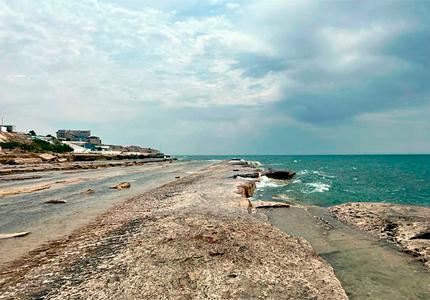 30 September30.09When Sea Becomes Fact of the PastWhy Tokayev Is Concerned About the Health of the World’s Largest Enclosed Body of Water
30 September30.09When Sea Becomes Fact of the PastWhy Tokayev Is Concerned About the Health of the World’s Largest Enclosed Body of Water -
 17 September17.09Risky PartnershipWhy Dealing with China Is Harder Than It Seems at First Glance
17 September17.09Risky PartnershipWhy Dealing with China Is Harder Than It Seems at First Glance -
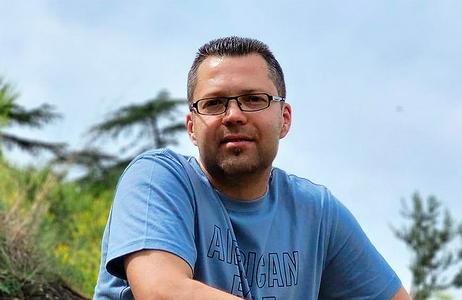 05 August05.08How Turkmenistan Lost Its Freedom of SpeechRuslan Myatiev discusses the past and present of censorship in the country
05 August05.08How Turkmenistan Lost Its Freedom of SpeechRuslan Myatiev discusses the past and present of censorship in the country
